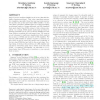Free Online Productivity Tools
i2Speak
i2Symbol
i2OCR
iTex2Img
iWeb2Print
iWeb2Shot
i2Type
iPdf2Split
iPdf2Merge
i2Bopomofo
i2Arabic
i2Style
i2Image
i2PDF
iLatex2Rtf
Sci2ools
118
click to vote
KDD
2002
ACM
2002
ACM
Scaling multi-class support vector machines using inter-class confusion
Support vector machines (SVMs) excel at two-class discriminative learning problems. They often outperform generative classifiers, especially those that use inaccurate generative models, such as the na?ive Bayes (NB) classifier. On the other hand, generative classifiers have no trouble in handling an arbitrary number of classes efficiently, and NB classifiers train much faster than SVMs owing to their extreme simplicity. In contrast, SVMs handle multi-class problems by learning redundant yes/no (one-vs-others) classifiers for each class, further worsening the performance gap. We propose a new technique for multi-way classification which exploits the accuracy of SVMs and the speed of NB classifiers. We first use a NB classifier to quickly compute a confusion matrix, which is used to reduce the number and complexity of the two-class SVMs that are built in the second stage. During testing, we first get the prediction of a NB classifier and use that to selectively apply only a subset of th...
| Added | 30 Nov 2009 |
| Updated | 30 Nov 2009 |
| Type | Conference |
| Year | 2002 |
| Where | KDD |
| Authors | Shantanu Godbole, Sunita Sarawagi, Soumen Chakrabarti |
Comments (0)

